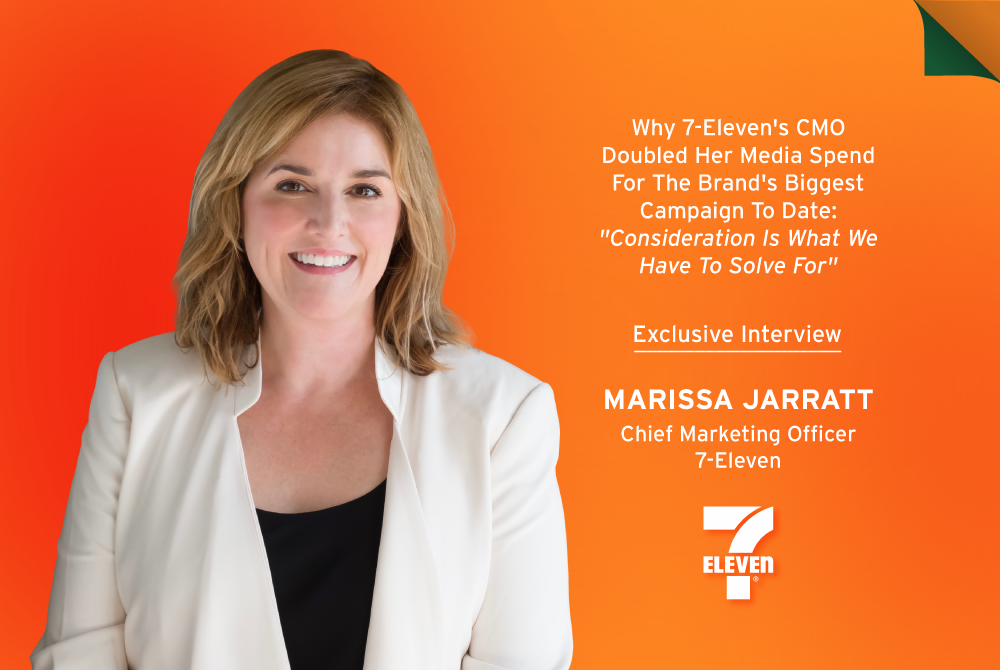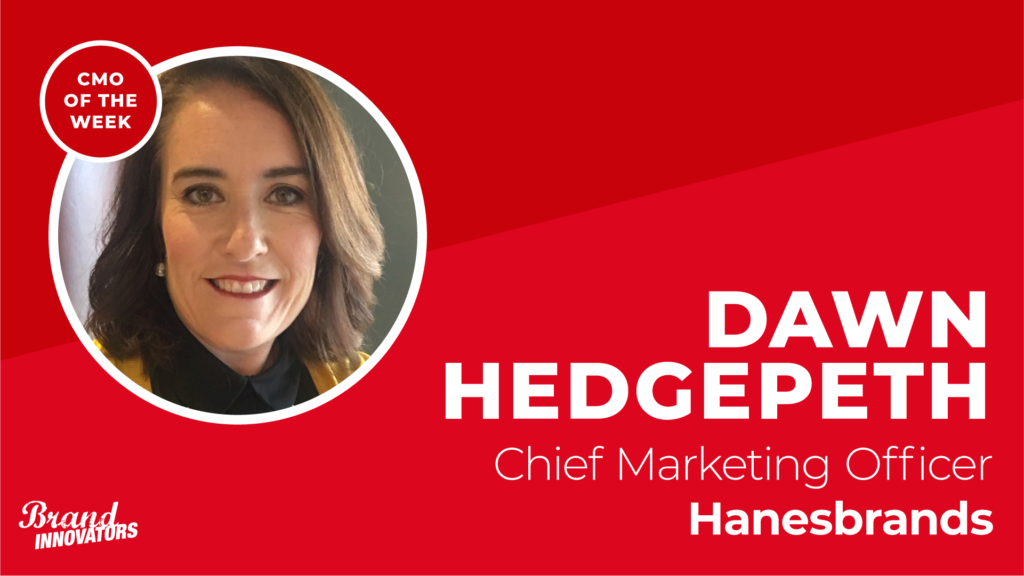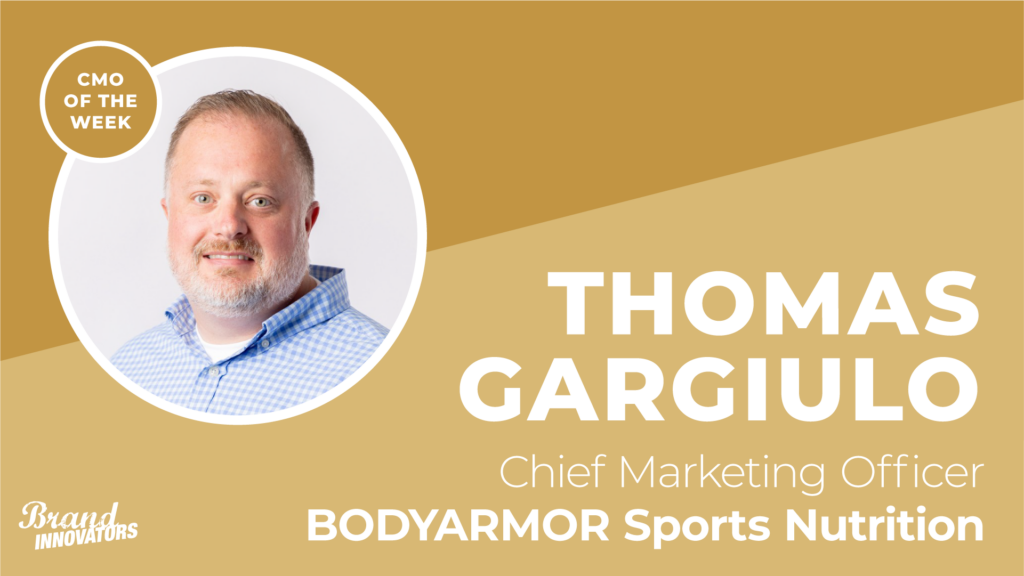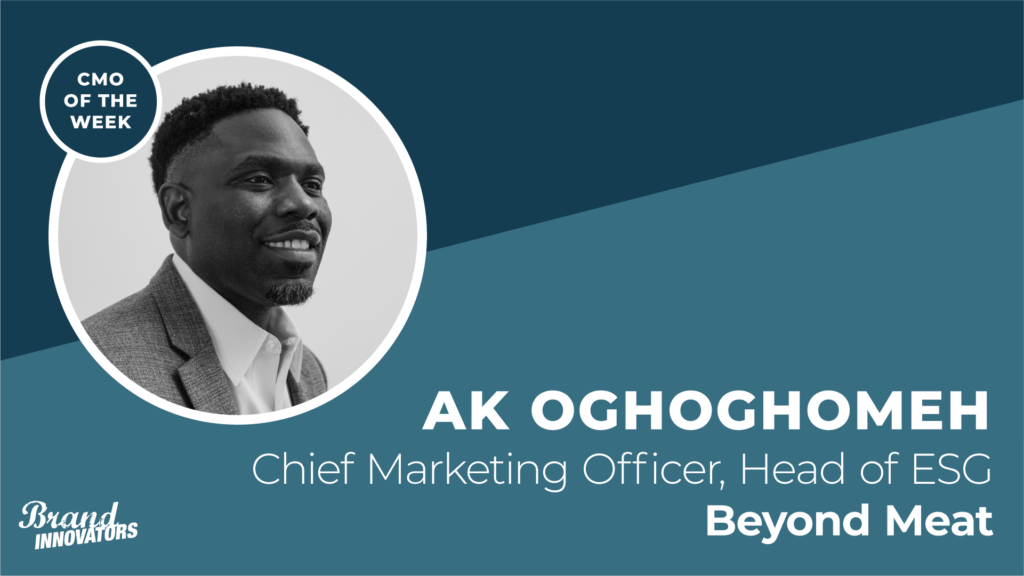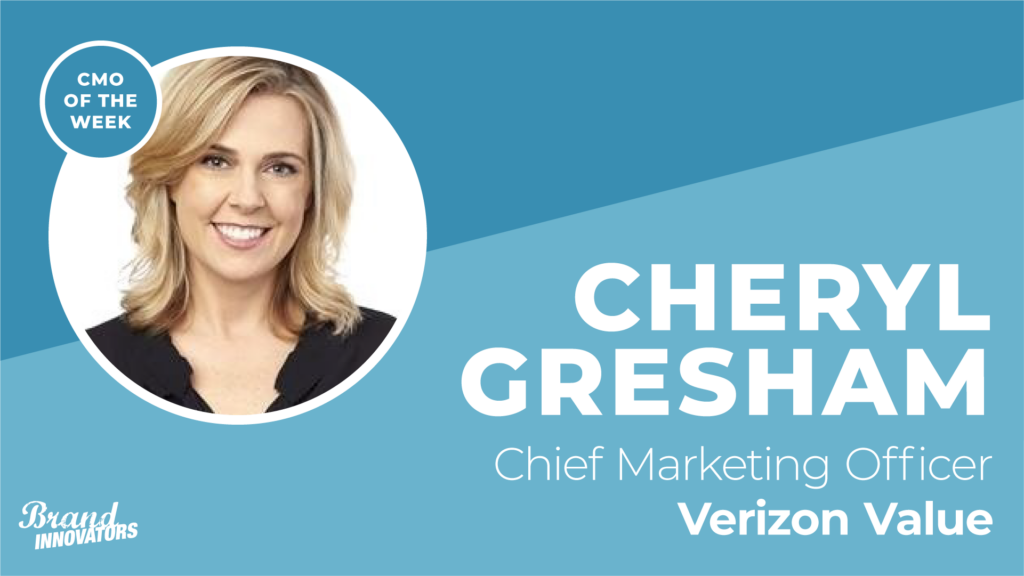As the world’s largest convenience store chain with more than 77,000 locations, 7-Eleven is one of the most ubiquitous brands on the planet. But Marissa Jarratt, chief marketing officer of 7-Eleven, isn’t relying on sheer omnipresence for her latest brand campaign, “Take It To Eleven” – the biggest in the company’s history in terms of scope and media investment.
“Awareness of the 7-Eleven brand is 99.5% [according to Morning Consult’s Brand Intelligence], but consideration is what we have to solve for,” says Jarratt, who joined the company in fall 2019 after 16 years of senior roles in packaged food marketing, including 14 at PepsiCo and two at Dean Foods. “Getting our existing customers to cross-shop more categories, and getting consumers who don’t currently shop at 7-Eleven to consider us for their coffee stop or their food, that was a big part of our campaign. So our TV investment increased 275% year-over-year, and I expect that to grow next year as well. We have also dramatically increased our investment in paid search as well as paid social, and part of that is because we’re trying to build our relevancy and presence whenever someone has a solution they’re looking for.”
“Take It To Eleven,” developed in partnership with 7-Eleven’s advertising and media agency of record, was directed by acclaimed filmmaker Harmony Korine (“Spring Breakers”) and will encompass a reported total outlay of $70 million in media spend throughout the year — more than double what 7-Eleven spent in 2020. A trio of TV spots showcases three unique shopping experiences for different customer groups: a leather-clad Rockabilly crew is seen making a morning coffee run in one, a roller skater glides into this local 7-Eleven for a Slurpee in another, while a third features a chicana bike crew grabbing a late-night Big Gulp.
“We wanted to show our new and current customers that the brand has injected a really new energy into what people think of when they think about the 7-Eleven brand,” Jarratt says. “It showcases the spirit of dialing things up, celebrating our customers’ ability to take things up a notch.”
Based on the campaign’s first three months in-market, the consumer response has been positive. “We’ve seen really strong social media response and consumer sentiment, and in-store interactions have been strong. Even among our franchisees the response has been good. If the people who work for the brand every single day get it, that’s a sign we’re heading in the right direction,” says Jarratt, noting that the campaign has already impacted 7-Eleven’s business “It’s still early days, I’ll just say that we’re seeing increases in trips to the store as well as our share of the market, and we’re seeing an increase in sales. All of that is just demonstrating how this media investment combined with the message is helping us connect with consumers and make an impact.”
Jarratt is also “early in the journey” of transforming 7-Eleven’s marketing function to integrate the company’s in-house agency, n-House (a play on the lowercase “n” in the brand’s logo), which was established in 2018. The team works closely with 7-Eleven’s external agencies 360i and Phoenix Creative to synergize creative, and is primarily responsible for the creative development and occasional deployment of 7-Eleven’s owned digital channels. “It’s a high-functioning partnership and we work hard at it everyday,” Jarratt says. For more on how 7-Eleven as well as Anheuser-Busch InBev, Mint Mobile and LEGO are piloting in-house agencies, check out the full recap of Brand Innovators’ July 22 State of In-Housing Livecast, hosted at 7-Eleven’s corporate offices in Irving, Texas HERE.
Brand Innovators caught up with Jarratt earlier that same day to learn more about 7-Eleven’s many pandemic pivots (and give-back efforts), how its delivery business quintupled during COVID and expanding the brand’s diversity & inclusion commitments. The conversation has been edited for length and clarity.
Brand Innovators: How prepared was 7-Eleven for the new consumer behaviors and retail trends brought on by the COVID-19 pandemic, and what are some pivots or innovations you put in place to meet the new market conditions?
Marissa Jarratt: We had a consumer delivery business we launched in 2018 and it was ready to go, then all of a sudden this new consumer demand sprung up as people were limited in terms of their mobility. We saw our delivery business quintuple last year, which is one of those great outcomes where we were able to lean into it and provide this great service to our customers.
And we expanded several digital businesses. In our 7-Eleven app, there are now many ways to transact with 7-Eleven in a frictionless, touchless way: one is a digital wallet, and the other is mobile checkout, which we piloted last year and just expanded to 3,000 stores. So we already had a lot of these digital features, and the pandemic really helped us accelerate the rollout.
And above and beyond that, we have been working for years on improving the quality and the value of the products we sell, which is driven in part because convenience is no longer just a channel, it’s kind of an expectation that consumers have. We need to be super competitive with the value that we can provide. We’re not just competing with other convenience stores, we’re competing with Walmart, Amazon, QSRs, food delivery companies, et cetera. We made a really concerted effort to offer market leading price points on our most popular items so that customers would see the value that we’re providing, and make 7-Eleven a more frequent part of their routine.
We developed a proprietary, white label business that’s now in about 90% of our footprints, and we have what we call marketplace partners with delivery brands like DoorDash, Uber Eats, Postmates and Favor in Texas only. Our business quintupled across both of those aspects, both white label and marketplace.
How did you keep your employees and franchisees safe during the early stages of the pandemic, and how have those safety protocols evolved?
This just speaks to the nature of the brand 7-Eleven, and how we view the brand and the role it’s played over 93 years. We’re a franchise organization, so keeping our franchisees financially viable, and making sure they had what they needed was an incredibly important strategic priority for us. We ended up investing close to $190 million into our franchisees to keep them stable and keep them in business from an operations perspective.
We also committed another $22 million to our corporate stores, and our store support center which we call our headquarters, to keep them going. Things like thank-you pay, and guaranteed incentives for all of our field associates, as well as all the PPE required to manage effectively during that crisis.
And in terms of our communities, the statistic is 50% of the U.S. population is within one to two miles of a 7-Eleven. So we take that community role and responsibility really seriously. Last year we were bombarded with opps to help different communities. A couple examples of that would be when we donated 1 million masks to FEMA in the early days of the pandemic. This was before we even knew as a country how important masks were, so the priority was getting masks to healthcare workers and first responders. We also created a first-ever hospital pop-up store in Dallas, that was designed to provide food and beverage to frontline workers who were working 12-16 hours, 7 days a week.
We did other things too, like helping a large part of our customers who are unbanked. When the federal stimulus payments were being issued for the first time last year, we partnered with a brand called Trans@ct to help get those payments into the hands of unbanked customers more quickly than it would have taken on the snail mail route.
So those are some of the things we’ve been doing at a macro level as an organization to respond to the pandemic. Having gone through this digital transformation as a company for several years now, it really put us in a great place to respond to the new needs of consumers.
Now that your delivery business has expanded so much this past year, what insights have you found that show you what types of products perform better via delivery vs. in-store?
The great thing about our delivery business is that it’s a complement to our in-store business. Typically, the orders we see in delivery spike on the weekends and in the evenings when people are home from work. Those time periods have always been a valley from an in-store sales perspective, so we see it as complementary activity across the week.
We also saw increases in our private brands portfolio, which continues to be a success story for us. We surpassed $1 billion in our private brands portfolio in December of last year, which speaks to the consumer demand for high-quality products of great value, as well as younger millennials and Gen Z looking for brands to explore and try.
We also saw an increase in our fresh food business. We sell food like hot dogs, pizza and hamburgers, and as you can imagine with our delivery business, one of the competitive differentiators is being able to offer fresh food items with an assortment of close to 3,000 items and a range of age-restricted alcohol products. We saw orders and interest for our pizza business really spike during COVID, and that’s sustained for us.
What actions have you taken this past year as a marketer to advance 7-Eleven’s diversity & inclusion, both internally at the organization and externally in your marketing?
We’ve stood up several new initiatives in the past year. Internally, we established a D&I creative board, which reviews all of our creative to ensure we’re referencing our customer base. We also have a committee that helps steer D&I at 7-Eleven, and that group has been a really important force for building awareness for different D&I initiatives and helping accelerate them. One example is for Pride Month, we invited some of our 7-Eleven associates to share what Pride means to them, which we did through a campaign called “All Flavors Welcome” as a reference to the Slurpee. We shared our associates’ stories on our Instagram channels, and it turned out to be a really engaging program that was designed for our associates and had a much broader play.
Externally, we’re really keyed into D&I because our customer base is so diverse and we want to make sure we reflect that diversity in our advertising. You’ll see that reflected in our “Take it to Eleven” campaign, you’ll see a broad spectrum in our ads from ages to ethnicity, and that’s really by design because everyone is welcome at a 7-Eleven. Importantly, you’ll notice that a parking lot is featured in all the spots, which we see as one of the world’s great equalizers. It’s a place where everyone from every subculture is always welcome to be yourself. We made sure to bring those notions of belonging and inclusivity through our casting and the storytelling.
And this fall, as we update our in-store communication, you’ll see us incorporate more lifestyle imagery into our photography and that is designed to be representative across the D&I spectrum to represent our customer base. It’s a pretty cool brand to be able to work on to show that, and we’re just getting started.
Andrew Hampp is an entertainment marketing consultant for Brand Innovators and the founder of consultancy 1803 LLC, based in Berkeley, California.
